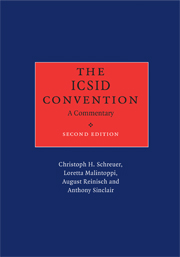Book contents
- Frontmatter
- Contents
- Foreword by Professor Sir Elihu Lauterpacht, CBE, QC
- Authors' preface to the second edition
- Table of cases
- List of abbreviations
- Text of the ICSID Convention
- Procedural calendar
- PREAMBLE
- CHAPTER I International Centre for Settlement of Investment Disputes
- CHAPTER II Jurisdiction of the Centre
- CHAPTER III Conciliation
- CHAPTER IV Arbitration
- CHAPTER V Replacement and Disqualification of Conciliators and Arbitrators
- CHAPTER VI Cost of Proceedings
- CHAPTER VII Place of Proceedings
- CHAPTER VIII Disputes between Contracting States
- CHAPTER IX Amendment
- CHAPTER X Final Provisions
- Article 67 Signature
- Article 68 Ratification and Entry into Force
- Article 69 Implementing Legislation
- Article 70 Territorial Application
- Article 71 Denunciation
- Article 72 Continuing Effect of Consent
- Article 73 Depositary
- Article 74 Registration
- Article 75 Notifications by Depositary
- Final Clause
- Consolidated bibliography
- Index by article
- Index by subject
Article 67 - Signature
from CHAPTER X - Final Provisions
Published online by Cambridge University Press: 07 September 2010
- Frontmatter
- Contents
- Foreword by Professor Sir Elihu Lauterpacht, CBE, QC
- Authors' preface to the second edition
- Table of cases
- List of abbreviations
- Text of the ICSID Convention
- Procedural calendar
- PREAMBLE
- CHAPTER I International Centre for Settlement of Investment Disputes
- CHAPTER II Jurisdiction of the Centre
- CHAPTER III Conciliation
- CHAPTER IV Arbitration
- CHAPTER V Replacement and Disqualification of Conciliators and Arbitrators
- CHAPTER VI Cost of Proceedings
- CHAPTER VII Place of Proceedings
- CHAPTER VIII Disputes between Contracting States
- CHAPTER IX Amendment
- CHAPTER X Final Provisions
- Article 67 Signature
- Article 68 Ratification and Entry into Force
- Article 69 Implementing Legislation
- Article 70 Territorial Application
- Article 71 Denunciation
- Article 72 Continuing Effect of Consent
- Article 73 Depositary
- Article 74 Registration
- Article 75 Notifications by Depositary
- Final Clause
- Consolidated bibliography
- Index by article
- Index by subject
Summary
Art. 67 is the first of the Convention's “Final Provisions”. Art. 67 determines the States that may sign the Convention. By contrast, Art. 68 sets out the rules for the Convention's entry into force. Art. 68 also makes it clear that the Convention is subject to ratification, acceptance or approval. This means that a State's signature, in accordance with Art. 67, does not amount to consent to be bound by the Convention. A State that has signed the Convention under Art. 67, but has not ratified, accepted or approved it in accordance with Art. 68, is not a Contracting State to the Convention.
Under Art. 25(1), a mere signatory cannot become a party to proceedings under the Convention (see Art. 25, paras. 211–220). By the same token, a national of a State that has signed the Convention under Art. 67, but has not ratified, accepted or approved it in accordance with Art. 68, may not become a party to proceedings under the Convention (see Art. 25, paras. 284–288). By contrast, the Additional Facility is available if only one of the States, the host State or the State of the investor's nationality, has fulfilled the requirements of Art. 68 (see Art. 25, paras. 224–226).
- Type
- Chapter
- Information
- The ICSID ConventionA Commentary, pp. 1267 - 1268Publisher: Cambridge University PressPrint publication year: 2009



